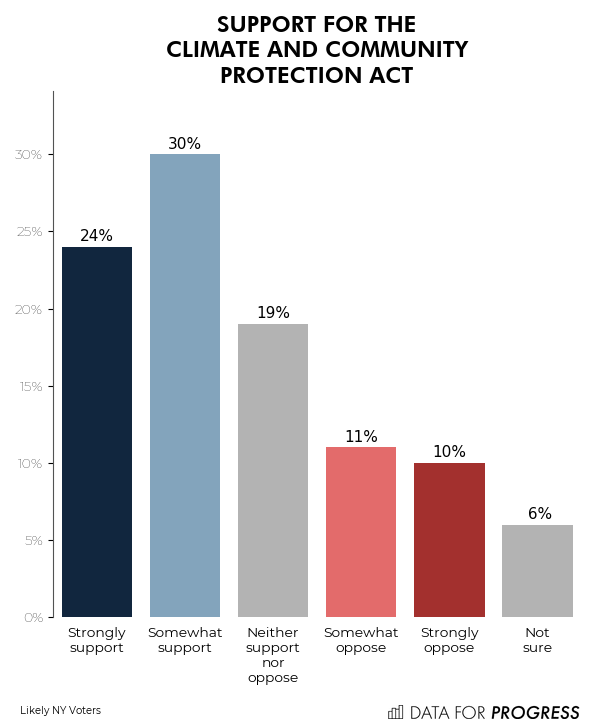The Climate And Community Protection Act Is The Future Of Climate Policy
By Sean McElwee (@SeanMcElwee) and Julian Brave NoiseCat (@jnoisecat)
Last week, New York passed historic climate legislation (for details, see our previous work on the CCPA). The legislation shows the political coalition that can make a Green New Deal style legislation viable: it is the product of four years of coalition building by the NY Renews Coalition, across labor, environmental justice groups, community-based organizations, political organizations, green groups, and more. This is the coalition that the Green New Deal seeks to mobilize in favor of climate action, and the success of CCPA (which was renamed the “Climate Leadership and Community Protection Act” during final passage) is proof that this coalition is viable.
Note: Several of the components of CCPA were changed slightly between DFP polling and eventual passage. The investment in frontline communities was changed from 40% to 35%, the 2050 goal was changed from 100% emissions reduction to 85% reduction.
As part of our Progressive New York Project, Data for Progress polled the Climate and Community Protection Act, asking voters, “The New York state legislature is currently considering the Climate and Community Protection Act (CCPA). If passed the CCPA would:
Set legal mandates on emissions in every sector of the economy,
Require that 40 percent of money invested in clean energy be directed at low-income communities,
and require that all clean energy projects meet minimum labor standards.
Do you support or oppose this proposal?”. We find that 54 percent of New Yorkers support the proposal, and only 21 percent were opposed.
There are five key lessons from CCPA that are key for the national discussion:
1. Environmental Justice And Economic Inequality Must Be A Central Part of Climate Policy
As part of a survey Data for Progress did to inform climate advocates on CCPA and our progressive New York Project (see here), Data for Progress tested individual components of the CCPA. We told voters, “Below are several individual components of the Climate and Community Protection Act (CCPA), for each, please indicate whether you support or oppose each component.” For the component, “Require that climate change policies and investments prioritize the New York state communities most impacted by climate change,” 62 percent of voters were in support, with 12 percent opposed.
As our GND Director, Julian NoiseCat wrote in the Guardian, the path forward for climate change is a combination of environmental and racial justice. A focus on frontline communities strengthens, not weakens our movement.
2. Labor Will Be A Vital Part Of The Green New Deal
Despite media narratives about the tensions with labor and climate organizing, we find in our polling that union households are supportive of the Green New Deal, even controlling for other variables. The NY Renews coalition includes labor unions like 32BJ (the first union to endorse the Green New Deal).
To be clear: there is much work that needs to be done creating inroads for the Green New Deal among labor and the environmental justice community. But CCPA and the Climate Jobs NY coalition prove that alliances are possible.
3. Targeting Co-pollutants Is Central To Climate Policy
In addition, the CCPA target co-pollutants as part of its ambitious strategy because carbon emissions often coincide with other pollution like PM2.5 and Nitrous Oxide that cause harmful health impacts, and these are concentrated in frontline communities. Our polling has consistently shown the lead removal and clean air and water are are the most popular part of the progressive agenda.
These impacts of pollution resonate strongly with voters and are an effective way to tie climate legislation to lived experiences.
4. Mandates Can Be Effective And Voters Aren’t Afraid Of Ending Fossil Fuel Use
We asked voters about comprehensive economy-wide emissions reductions mandates.
We also asked about ending fossil fuel use and found strong support.
In a recent survey we posed another experiment designed to ascertain respondents’ support for policies rather than their support for candidates on the basis of those policies. Specifically, we randomly asked respondents to evaluate the following two policies: "levying a new tax on carbon pollution" or "providing for public investment in clean energy infrastructure and requiring carbon emissions reductions through regulation." Respondents were slightly more favorable of new public investment.
5. We Can Create Jobs And Fight Pollution
Pitting the economy and the environment is absurd - we’ve shown that most voters find the dichotomy absurd. In the case of the CCPA, the legislation will create 150,000 jobs a year.
The CCPA shows the coalition we need to win: labor, environmental justice and environmental groups. Most importantly, the CCPA shows that this coalition can be united around a climate policy centering climate jobs and justice.
The next step for New York is the Climate and Community Investment Act, funding necessary to meet the mandates in the CCPA. The next step for the nation and climate community is to take the lessons of the CCPA and apply them nationally.
Sean McElwee (@SeanMcElwee) is a co-founder of Data for Progress.
Julian Brave NoiseCat (@jnoisecat) is Director of Green New Deal Strategy at Data for Progress.






